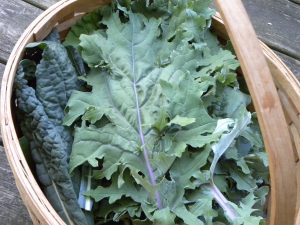
Kale Mix Harvested
This past spring saw a surge of interest in gardening and in articles on the topic. I came across one by a woman who had good advice, but made a comment that didn’t sit right with me. She said her family’s reason for growing their own food was not ideology since they believe in interdependence.
After much reflection, I realize my discomfort is in being asked to choose between interdependence and independence, as if anyone could be just one.
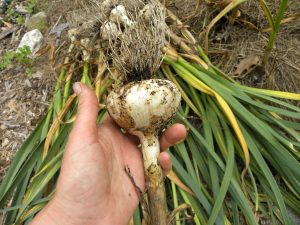
My Garlic
Certainly I am seeking to gain skills that make me feel strong and responsible and let me take back some power over my basic needs. But I don’t see that as isolationist – in fact, it often comes from a place of seeing and caring about my connections to the rest of the world and wanting to improve those relationships. I continue in the tradition of The Nearings and Wally and Juanita Nelson with a philosophy of food growing that strives to honor and experience my interdependence with the whole
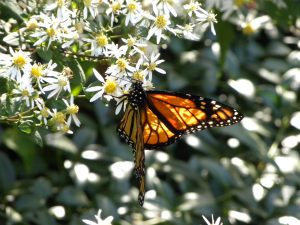
Monarch Pollinating
planet and find ways to live here that avoid doing harm.
My goal is to do more for myself, and then to shift who I am dependent on to more local sources and relationships. That way, I can have some say in how things are done, as well as cutting the travel footprint of goods. But I don’t expect to ever be going it alone.
I also find that the 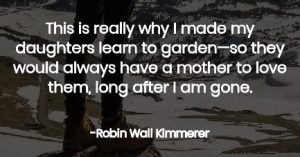 more I engage in these activities the more connected and interdependent I often feel, in both liberating and frustrating ways.
more I engage in these activities the more connected and interdependent I often feel, in both liberating and frustrating ways.
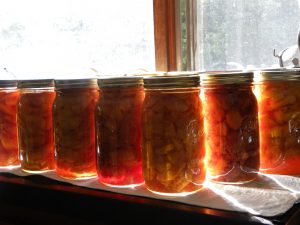
Canning Peaches
A full root cellar and shelves of preserved food in the fall brings me such pride and satisfaction and a sense of safety. But, being a gardener during a drought, as I am right now, is tremendously humbling, a moment when I truly understand how little control I personally have over the world and my own best-laid plans. Keeping bees also shows me the limits of my personal power. Although I can work hard to be a good beekeeper, I can’t control many of the problems they suffer from: exposure
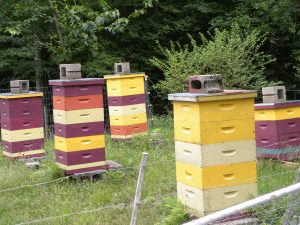
My Apiary in June 2020
to pesticides and fungicides, forage opportunities lost to development and lawns, erratic weather including droughts, and new diseases and pests traveling quickly around the globe.
These situations help me understand the balance between what I can do by myself and what I must join with others to accomplish.
I live in the US, a culture that tends towards extremism and either/or dichotomies: you’re with them or against them; powerful or a victim; independent or helpless; useful or useless. I am also posting this a couple of weeks after July 4, US Independence Day, when people celebrate the concepts of freedom and self-reliance. Those are great qualities… but when they are emphasized by themselves, they become warped, even pathological, devaluing our connections to and care for others and exacerbating loneliness.
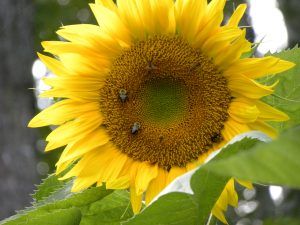 If anyone starts to really think it through, it quickly becomes clear how much we depend on others, especially in a complicated, industrialized society. Even if you have all the skills to fix your computer, your car, your health problems, pave your own roads, make your own clothing, grow your food, cook and preserve it – no one person has the time to do all that. When we pay others to do this work we somehow don’t count it as a dependency, but it is. Can we embrace that, or at least accept that it is the reality?
If anyone starts to really think it through, it quickly becomes clear how much we depend on others, especially in a complicated, industrialized society. Even if you have all the skills to fix your computer, your car, your health problems, pave your own roads, make your own clothing, grow your food, cook and preserve it – no one person has the time to do all that. When we pay others to do this work we somehow don’t count it as a dependency, but it is. Can we embrace that, or at least accept that it is the reality?
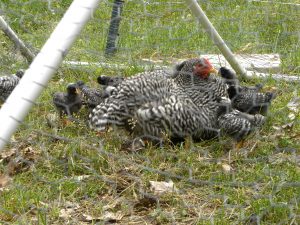
Hen with Chicks
I can relate to the wish of needing no one but myself. I grew up in a chaotic, stressful house with a mother who had Multiple Sclerosis. I watched her lose all her physical abilities and become increasingly dependent on others, while receiving the societal message that this made her less and less valuable. It was excruciating for my whole family, and from there the idea of living alone in the woods depending on only myself had a certain appeal. I started camping as a young woman, even took classes in “primitive skills” to learn how to survive by myself.
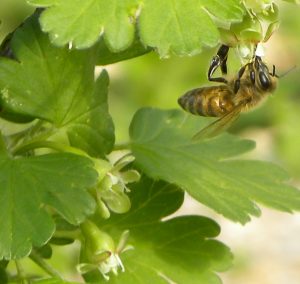
One Bee on Gooseberry
However, I discovered that the amount of work and dedication that took was more than I could realistically do by myself for any length of time, shaking my illusions of truly doing it by myself.
There is now lots of research including in the fields of neuroscience and health that show how social our species is and how isolation hurts us. I also raise other animals so I have a comparison point. Our goats can stand, run and clean themselves within an hour of birth, and our poultry aren’t far behind,
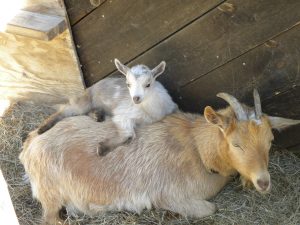
Mom and Kid
while a human takes years to do those things and then lots more to be taught other necessary skills to live well. Yet we have this wish to see ourselves as needing no one.
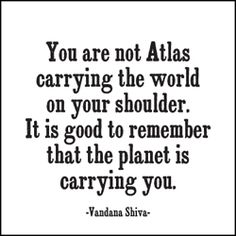
It is both humbling and beautiful to see how connected we are. To consider how little control I really have over the world and my life scares me. But, to see how much a part of a larger whole I am, to feel how much support I receive just to be alive, and to know that I share the responsibility for the world with many others is a big relief.
I don’t think I’m alone in internalizing this more deeply lately. In this time of pandemic and economic crisis, many people see that we are truly in this together. Can we find more ways of acting like it across race, gender, class, political beliefs and species? We have so much to gain.
“It is a law of life that man [sic] cannot live for himself alone. Extreme individualism is insanity. The world’s problems are also our personal problems. Health is achieved through maintaining our personal truth in a balanced relation of love to the rest of the world.” –Harold Clurman
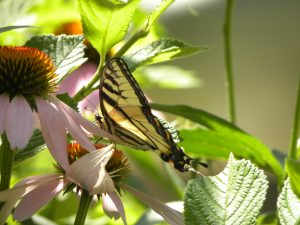
Swallowtail Butterfly on Echinacea

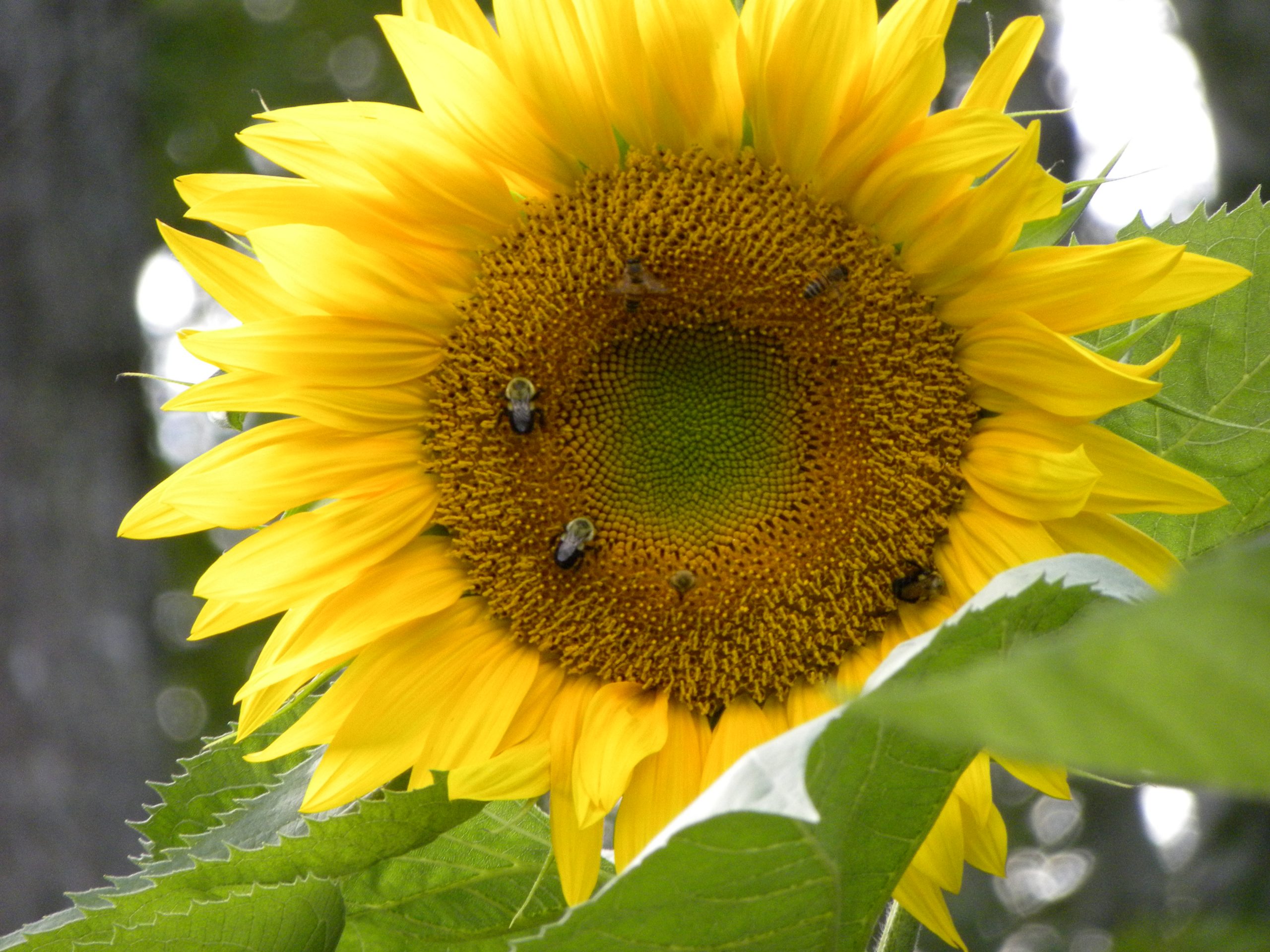

Wonderful post, Amy. Certainly if we recognize that we humans are a part of the cycle of biology we have to realize that we are interdependent. Someone once pointed out to me that as a country of immigrants who self selected to leave their homes of origin we have the collective DNA of very bold, independent peoples. Right now we use terms like “herd immunity” but we are not really a “Herd”. The debate about masks makes that clear. Sadly, “social” media that promised to bring us together has the unintended consequence of also polarizing. This pandemic has the effect of isolating us from each other unless we also make a conscious effort to appreciate the many areas of intersections and interdependence we rely on. Thanks for the reminder. Enjoyed seeing the well chosen pictures and reading the quotes.
Thanks, Ellen! That’s a good point that the US in particular is made up of a certain sort of people – people who left where they once belonged, often due to pain and violence. That generational trauma and separation is still with us. Figuring out how to reconnect to place and community and stop allowing more powerful people with an agenda to pit the rest of us against each other seems critical to make any progress on issues we care about – and to be comfortable in the world!
I think the idea of the herd can be parsed in different ways. We sure are a diverse group of folks who don’t often don’t agree. But, biologically speaking, we are still pretty close to the same in the face of something like coronavirus. I guess this is another both/and situation – we have tremendous diversity AND are all the same.
Thank you for reading and commenting, Ellen, it means a lot to me!